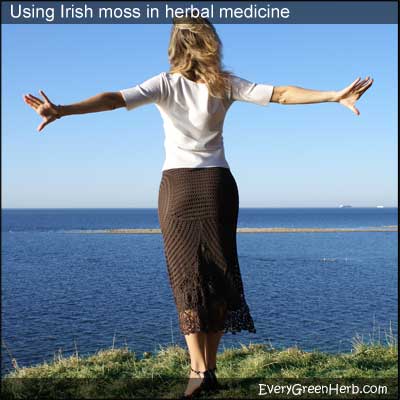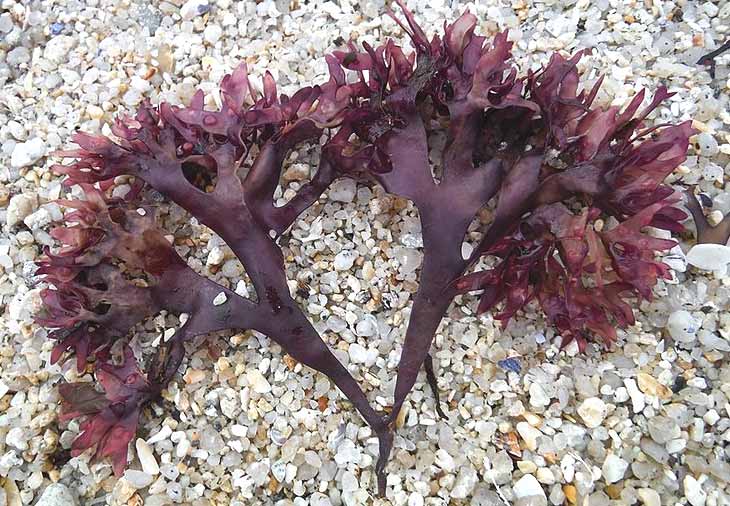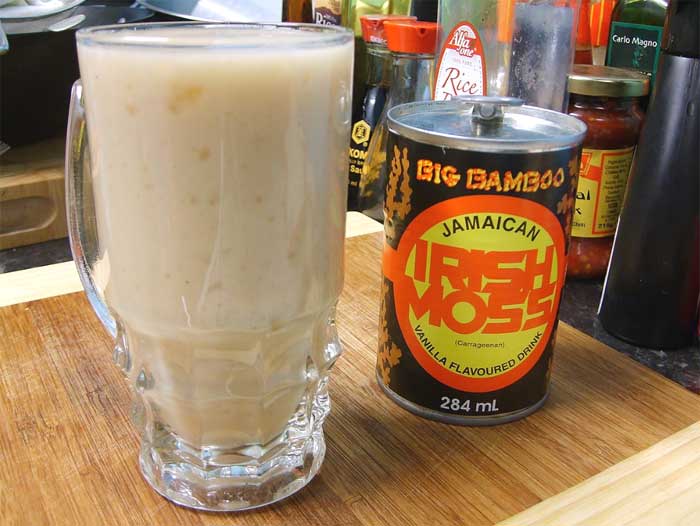Irish moss in herbal medicine and home remedies

Irish moss (Chondrus Crispus), also known as carrageen, is a perennial seaweed that grows off the European and North American Atlantic coasts. The plant grows just below the surface of the water to depths of up to seventy-five feet and attaches itself to rocks and stones.

Irish moss treats respiratory and digestive problems.
Irish moss is an excellent expectorant when taken internally. In herbal medicine, it is used for treating respiratory and digestive complaints.
Irish moss helps lung conditions such as irritating coughs, bronchitis and other breathing problems.
It helps digestion by protecting delicate tissue and internal ulcers, so healing can begin.
Irish moss can hold 30 times its weight in water! Always soak dried Irish moss in water before use.
Irish moss is rich in minerals.
The plant contains a high nutrient content and is rich in minerals including iodine and sulphur. Irish moss is especially good for protecting the digestive system. Add some to your diet everyday or as needed.
Irish moss helps prevent vomiting, and acts quickly to sooth peptic ulcers and inflammation of the urinary system.
Irish moss is also used to treat constipation and diarrhea due to its high fiber content.
Irish moss is a type of seaweed.
In the summer in North America and in the fall in Ireland, the plant is pulled up with a rake at low tide, and dried in the sun.
Irish moss varies in color from dark purple to yellowish brown. It keeps for many years if not exposed to moisture.
*Note - most seaweeds are nutritious super-foods. They can be purchased at health food stores and some grocery stores.
When boiled, Irish moss is like jelly.
Irish moss is usually purchased in its dried form. It’s not much of a surprise that when soaked in water, Irish moss smells like the sea and has a pleasant salty taste.
When boiled, it forms a jelly due to its high mucilage content. Irish moss is added to drinks, soups, stews, and other recipes.

Irish moss decoction recipe
The dried herb can easily be made into a decoction or tea.
- Steep half an ounce of the herb in cold water for 15 minutes and then boil it for 10-15 minutes in 3 pints of water (or milk).
- Strain and add licorice, lemon, ginger, cinnamon, cocoa, or honey.
- Take freely as needed throughout the day.
Irish moss helps speed recovery.
Irish moss helps speed recovery from debilitating illness, especially T.B. and pneumonia.
Irish moss has anti-viral properties.
Research has shown that Irish moss has anti-viral properties and may be useful in treating influenza and the mumps. Studies support the herb’s value in treating ulcers and reports say that Irish moss can be considered an anti-coagulant (blood thinner).

Irish moss is used for thickening foods and beauty products.
Irish moss’s high mucilage content makes the plant useful for thickening soups, making jellies, and adding to face creams and lotions.
It is used as a stabilizer in ice cream, luncheon meat, and toothpaste. Irish moss also acts as an emulsifying agent for cod liver oil.
In a products ingredients list, Irish moss is usually called carrageen.
Carrageenan, with an extra an on the end, is a man-made extract.
Carrageen is a whole plant considered to be a healthy sea vegetable. Carrageenan, on the other hand, is a type of extract of carrageen and may cause stomach and digestive problems in some people. Carrageen and carrageenan are easy to confuse when reading ingredient lists so buyers beware.
Safe or harmful? Whole or processed?
Gelatinous extracts of Irish moss seaweed have been safely used as food additives for hundreds of years.
The man-made extract known as carrageenan is used as a vegetarian alternative to gelatin, and is added to everything from yogurt to ice cream.
Carrageenan has undergone many long-term dietary studies but results are not clear. While some reports indicate that carrageenan safely passes through GI tracts without adverse effect, other studies have observed colitis-like disease and tumor promotion.
We can assume that Irish moss is safe, but perhaps the processed extracts can be harmful when over-used. This is just one example of how isolating a substance from a healthy food can be harmful.
Seaweed and science
Irish moss and other seaweeds are nutrient rich, containing minerals, vitamins, dietary fibers, protein, essential amino acids, and polyphenols. They have strong antioxidant and anti-inflammatory properties.
Bioactive compounds in seaweed possess activity against some types of cancer.
- Brown seaweed is antibacterial, antiviral, anti-inflammatory, anti-coagulant, and anti-thrombotic.
- Red seaweeds, such as Irish Moss, are used in biomedicine as a suspension solution in prescription products and as an anticoagulant agent. Red seaweed contains anti-tumor and immune building properties.
- Green seaweed is rich in ulvan, a sulphate polysaccharide that is used as an emulsifier, stabilizer, and thickener in food products and in the pharmaceutical industry.
Seaweed can be eaten as a food, taken as a medicine, or used as fertilizer to make our crops more nutritious!
Irish moss contains a form of calcium that is readily available via our digestive tract. It also contains vitamin C which helps the body utilize iron.
Irish moss is also used for gout and as an astringent.
Irish moss extracts have been found to possess neuro-protective properties. This is good news for our central nervous system and brain!
*Some seaweeds contain high levels of heavy metals and should not be consumed. Always do research before trying something new, and always purchase herbs from trusted sources.
Irish moss thickens food, but thins the blood! Because of its blood-thinning properties, Irish moss should not be used by those taking anticoagulant medications.
Because of its iodine content, those with thyroid problems or on thyroid medications should avoid taking large doses of this herb.
Always consult with your doctor before taking any herbal remedies.
Sources:
https://www.ncbi.nlm.nih.gov/pmc/articles/PMC8232781/
Blessings to you and yours!
Thanks so much for reading my blog. Jan.

*Note - the information on this website has not been evaluated by the Food and Drug Administration.
© 2005-2024 website design and content by Janice Boling